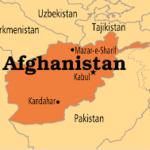As expected, the Taliban’s dramatic and largely unresisted advance has culminated in their return to power in Afghanistan 20 years after they were overthrown by the US invading army in pursuit of Osama bin Laden and Al-Qaeda members who it believes were behind the September 11, 2001 attacks in Washington and New York.
Interestingly, contrary to the general assumption, the United States has never designated the Taliban as a terrorist organisation; it only accuses the group of cooperating with some of the most dangerous groups on its terror list i.e. Al-Qaeda and its affiliates; an inconsistency that can best be described as ‘ba cinya ba, kafar baya’.
- Australian varsity, IT firm offer Nigerians student online study options
- Edo community, Army bicker over demolition of houses
Just like every other country, the US only designates a group or individual as a terrorist based on its interests. The lack of absolute unanimity on the definition of terrorism explains why a terrorist in the eyes some may be a freedom fighter according to others.
Now, as much as the return of the Taliban to power has generated all sorts of explanations, it left many people wondering what explains the circumstances surrounding the development as a whole.
Though the US overthrew the Taliban regime in 2001, it soon began to realise that the country was too complex for a mere regime change to change it. Also, after pumping hundreds of billions of dollars into the country over two decades to create and nurture a reasonably stable US-allied state with adequately equipped and well-trained security personnel, the country’s underlying ethno-cultural and socio-political peculiarities, which the US couldn’t take into consideration, undermined and eventually frustrated its efforts.
Following their defeat in 2001, the Taliban turned to guerilla warfare tactics killing more than 2,000 US military and security personnel over the two decades, and, of course, exhausting the Afghan army and security personnel.
The US began to grow increasingly frustrated as it was spending massive resources and losing its military personnel to the Taliban attacks in an impoverished and landlocked country with neither instantly exploitable resources nor any strategic importance to it. Besides, the country had ceased to pose any significant threat to the US following its elimination of Al-Qaeda and other foreign fighters in the country.
Also, the largely apathetic Afghan military personnel were still incapable of tackling the Taliban unaided. Equally, the largely corrupt Afghan military and political elite were neck-deep in the systematic misappropriation of the country’s already meagre and mostly US-provided resources. They also couldn’t grow beyond their respective, tribal, regional affiliations and other deep-seated prejudices.
Therefore, and clearly with prior approval, if not an order, from Washington, Qatar reached out to the Taliban to broker a deal between it and the United States.
Interestingly, Qatar is a tiny but superfluously rich Arab Gulf state hugely obsessed with geopolitical influence disproportionate to its size. It pursues its agenda by investing massively in sponsoring anti-establishment political groups and non-state actors in various countries across the Middle East and North Africa (MENA region). It equally provides them with media platforms on its influential Aljazeera satellite television network, which it also uses to glorify them and demonize their respective governments thereby constantly putting itself at loggerheads with various governments in the region.
Anyway, around the beginning of 2010, Qatar effectively adopted the Taliban, following which the group’s leaders were politically refined in its capital, Doha, over the subsequent years within which talks were held between the group’s representatives and their US counterparts.
Also, in 2013, Qatar established the Taliban’s political bureau in Doha, which was the first and only one of its kind, to institutionalise contacts between them and the United States in the atmosphere of irresistible luxury and glamour away from Afghanistan.
Since then, the Taliban has been increasingly involved in international diplomacy acquiring considerable skills in the process that on different occasions it managed to blackmail the US into making concessions by capitalising on its desperation to pull out of Afghanistan without jeopardising its interests.
The Taliban representatives also visited the capitals of some major international and regional players for talks with governments’ officials and representatives of international bodies.
Besides, all through the US-Taliban negotiations in Doha, the former had effectively treated the latter like a substantive government, not a group, leading to the ratification of the deal between them in February 2020. For instance, the deal provides, among other things, that the US would withdraw its forces from Afghanistan, while the Taliban, in return, agreed not to harbour or allow anyone or group threatening the security of the United States or its allies to operate in the country.
After all, from the way the US pulled out of the country, it was clear that it effectively handed it to the Taliban on a silver platter. Equally, the reactions of the other world powers, which suggest no surprise, imply that they were at least privy to, if not part, of the whole thing all along.
Now, though the new Taliban government would be different from the pre-2001 Mullah Omar-led government, it wouldn’t necessarily live up to the US expectations. Yet, as long as its grip on power doesn’t threaten the US security or jeopardise its interests, any other excesses it may commit would be overlooked.

 Join Daily Trust WhatsApp Community For Quick Access To News and Happenings Around You.
Join Daily Trust WhatsApp Community For Quick Access To News and Happenings Around You.

